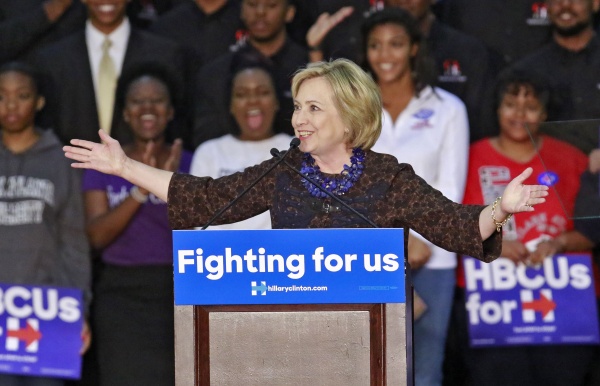Presidential Candidates Use Social Media to Increase Youth Outreach
TNS
Democratic presidential candidate Hillary Clinton gives a speech during a campaign rally at Clark Atlanta University on Friday, Oct. 30, 2015, in Atlanta. (Bob Andres/Atlanta Journal-Constitution/TNS)
November 19, 2015
Buzzfeed recently announced that it will be having a college tour series to help advertise its news app, and Hillary Clinton is the first candidate to sign on. This is just one instance of candidates trying to appeal to young voters.
Social media is not something political candidates had to deal with just a few years ago. “I think they use social media often as a joke,” Kaitlyn Lyngaas, Fordham College at Lincoln Center (FCLC) ’16, said. “They try very hard to make it funny and use memes, and appeal to younger generations.” The age gap between candidates and young people is extremely prevalent when they are trying to appeal to young voters. For instance, Hillary Clinton handed out coozies, a fabric sleeve that is used to keep your drink cold, that had “Chillary Clinton” on them to appeal to young people and boost her presence on social media. However, that largely became a joke.
Presidential candidates have tried to have stronger presences on social media. In a Harvard University Institute of Politics survey of over 3,000 18 to 29 year olds, only 16 percent used Twitter to advocate for a political position, and 24 percent liked a political candidate on Facebook. “Based on what I have researched, the people who are already politically interested, that are already following the election, are more likely to use whatever technology or media they have access to research candidates,” Penina Wiesman, adjunct professor of communication and media studies, said.
“Because of this, they are most likely only going to be reaching those who are already politically engaged in the first place,” she said.
Social media can be useful for a candidate, and all candidates are using social media. However, they are not always getting young people interested in voting. “I think social media is a great tool you can get to people a lot of people that they normally wouldn’t be able to access through regular media. However, I do think that there needs to more than just social media,” Eileen Kelly, FCLC ’17, said.
“We aren’t that superficial. Yes, we are all on social media, but that won’t get us to necessarily be interested in politics,” she said.
This is a big problem in the world of politics today. Using social media alone may not be the best way to reach those who are disinterested. “There are young people that are really not politically active. They are not going to welcome politicians reaching out to them and they are just going to ignore the stories that the politicians post in the first place,” Wiesman said.
According to a Harvard University Institute of Politics survey, 34 percent of young voters did not vote in the last election. When asked if they would be voting in the 2016 election, only 36 percent were sure they would. “We are the largest demographic right now entering into our 20s, so it’s disappointing to see people not wanting to vote,” Kelly said.
“I don’t know why so many young people don’t vote, and I really wish I did,” Lyngaas said. “I just started volunteering with the Bernie [Sanders] campaign, and we were in Washington Square Park trying to register new voters, and they didn’t have to be Bernie supporters, but it was anyone who wanted to register to vote for any reason, and there were so many college-age people who were like ‘oh, I’m not voting.’”
“I think this specific generation is more media savvy and more critical and suspicious of politicians in general,” said Wiesman. This generation has grown up in an interesting time for politics, which has made its members much more jaded toward politics as a whole. “I think the number-one problem is a lack of trust in the government. A lot of the young people today can barely remember a time where Washington wasn’t gridlocked or jobs were accessible,” said Kelly. “Also, a lot of young people were behind Obama, and they were really excited with his message of change, but now, after two terms, seeing him not make these huge dramatic changes that he was saying he would has left a lot of young people wondering, ‘Well, will anyone be able to make change?’”
Young people continue to be disinterested, and it is not a problem that will be fixed in this election. “It is really hard to reduce it into a simple answer because it is a really complex phenomena,” Wiesman said.
“Our entire government is run by old people,” Lyngaas said. “I think it is really important for young voters to actually go out and vote, because it is the only way for any of our concerns to actually be addressed.”










